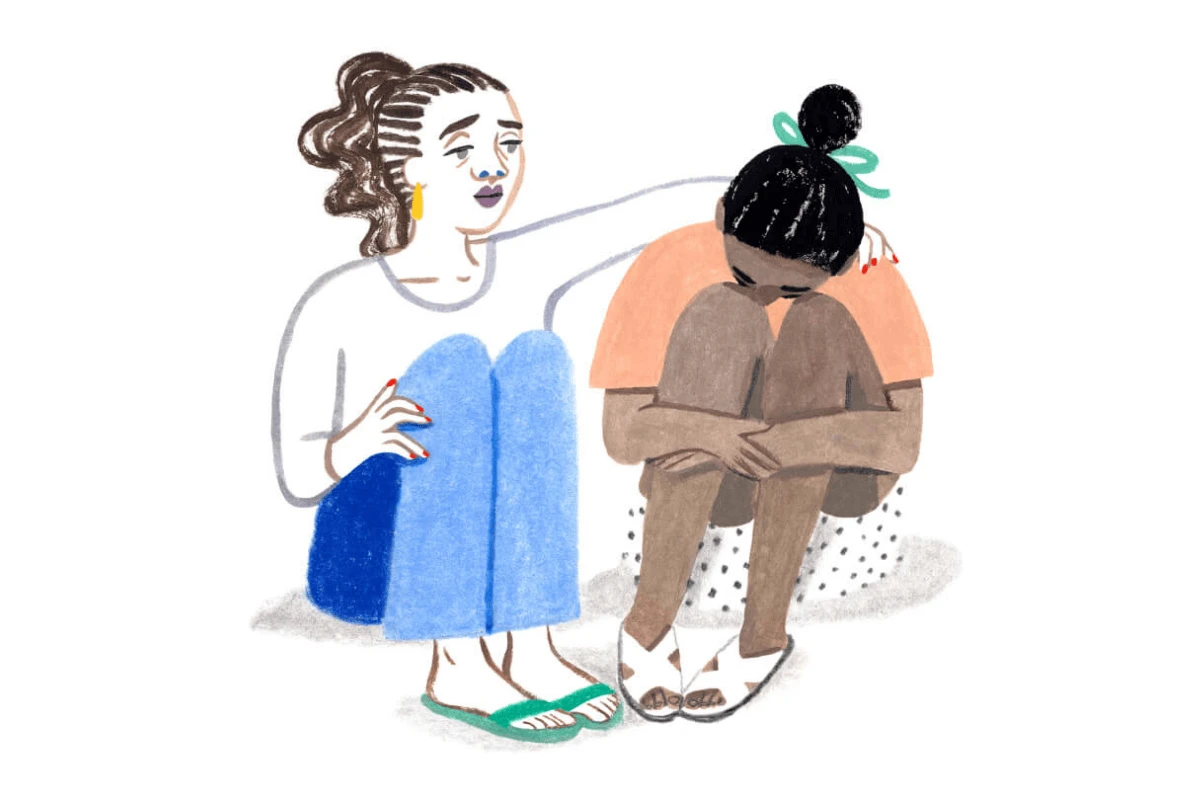Though the most well-known eating disorders are anorexia, bulimia, and binge eating disorder, there are several kinds of eating disorders that, in total, affect 9% of the national population.
Eating disorders (E.D.) are dangerous, sometimes even fatal, and they can have serious mental and physical health consequences if not treated properly. And they can strike anyone—though girls and women, and those who identify as girls and women, are about twice as likely to develop an E.D.
If you think a loved one might be in the grips of an eating disorder, it can seem like a subject too personal or awkward to discuss with them. But this is one situation where it is definitely better to be safe than sorry, as the longer an eating disorder goes untreated, the more dangerous it becomes.
The conversation will probably be uncomfortable, and that’s going to be hard to avoid. But there are some things you can do to make it easy and helpful. Read on for eight tips for approaching a friend about possibly having an eating disorder.
1. Do not start this conversation around mealtime
This might seem obvious, but some experts suggest the absolute most important thing is that you don’t bring this up around lunch or dinner.
These times in and of themselves can be triggering for those with eating disorders, and this conversation could exacerbate that. It’s especially harmful to bring it up during a meal—this is likely to be taken as an accusation rather than an expression of concern.
2. Be as physically comfortable as you can be
Suggesting your friend might need help is likely to stir up a lot of tension, so do your best to offset that by making your surroundings as peaceful as possible. Be sure the conversation takes place somewhere private, where you can both speak freely, and somewhere familiar to your friend.
Beyond that, try to find a time when you’re both in good moods, well-rested, and a time when you won’t be interrupted.
3. Inform yourself
You have to understand that your friend has a mental disorder—not a weight disorder. Telling them they look great and don’t “need” to restrict their eating is not helpful.
The more armed you are with research, the more likely the conversation is to be productive. You don’t have to know every single thing about eating disorders, but the more understood your loved one feels, the more likely they are to open up.
Organizations like the National Eating Disorder Association, the National Association of Anorexia Nervosa and Associated Disorders, and the Academy for Eating Disorders have a ton of helpful information.
4. Bring up concerns, not accusations.
Use "I" statements to avoid sounding like you are blaming your friend. You can only know how you feel and what you’ve observed; by focusing on that, you avoid like you’re blaming them.
Below are some examples:
“I get upset when you critique your body so harshly.”
Not “You’re always talking about the way you look.”
“When I notice you’re not coming to breakfast, I get worried.”
Not “You haven’t eaten breakfast in weeks!”
“I’m concerned by how much you’ve cut out of your diet.”
Not “You’re so neurotic about food."
“I’ve noticed you’re not as engaged with our friend group, and it makes me curious if something’s going on.”
Not “You’re never around.”
That said, there is one important “you” question that you might want to start the conversation with: “Are you OK?"

5. Focus on behaviors
Again, you do not want to make your friend feel cornered. By only mentioning specific behaviors you’ve observed ("I’ve noticed you started going to the gym three times a day" versus "You’re obsessed with working out"), you are pointing out concrete concerns rather than projecting feelings onto your friend—or worse, criticizing their behavior.

Eating disorders are complex issues, and you should acknowledge the suffering your friend is going through.
Talking about behaviors also steers the conversation away from appearance, which can be very triggering for some people with eating disorders. It is not helpful to make comments, whether they be positive or negative, on your friend’s appearance. Never address appearances during this conversation. Focus on facts to keep the conversation calm and productive.
6. Offer your help
Your friend is their own person and in control of their own life, and it’s important that they feel that throughout the conversation. They may not feel ready to acknowledge any issues in their relationship with food, so make sure you don’t demand it. Clarify that not only are you there if they need help, you want to help.
A great way to do this is to ask directly—“How can I support you right now?”
Concrete ways you can show you want to help include providing information, offering to help your friend find a doctor, or accompanying your friend when they talk to their doctor.
7. Acknowledge the hard stuff that your friend is going through
Eating disorders are emotionally and physically taxing, and treatment is no easy process.
Make sure your friend knows that the insecurities, worries, and obsessions they are dealing with are valid, and that they’d be difficult for anyone. The struggles that come up in an eating disorder are nothing to be ashamed of.
Don’t suggest simplistic advice like “Just eat a burger.” Eating disorders are complex issues, and you should acknowledge the suffering your friend is going through.
Part of this is validating everything your friend says. If they say “I look gross,” or “My life is garbage,” don’t talk them out of those feelings—acknowledge that those are expressions of someone who is really struggling.
8. Make sure it’s clear that you are coming from a place of love and support.
Reminding your friend throughout your conversation that you love them and want to help them is important. Telling them things you love about them that aren’t appearance related, like their kindness, intelligence, or humor, is a great way to make them feel valued.
Your friend may not agree with your concerns or get offended or angry that you think they have an eating disorder, so it’s important to make sure your friend leaves the conversation feeling loved and supported, no matter what.
Be prepared that this may be the first of many conversations.
Even if your friend isn’t ready to acknowledge their potential eating disorder, having this conversation with them is a helpful first step. If you notice that concerning behaviors continue, you should bring your concerns up again. Eating disorders can be fatal, so it’s best to keep trying to get your friend help if they need it.
If your friend is receptive to your concerns and agrees with you, check out the following resources together:
-
Particularly helpful may be the NEDA page on binge-eating disorders
National Association of Anorexia Nervosa and Associated Disorders
Finally, remember that one conversation isn’t likely to change your friend’s behavior. It could make things more awkward, and it’s on you to dispel that awkwardness. Keep up your usual activities together.
While nagging isn’t recommended, it is a good idea to check in after a few days and let your friend know again how much you love them and that you’re here to support them if they ever want to talk.
How to Help a Loved One. (2017, February 26). How to Help a Loved One. Retrieved from National Eating Disorders Association website: https://www.nationaleatingdisorders.org/learn/help/caregivers
I Think My Friend May Have an Eating Disorder. What Should I Do? (2014). Retrieved from Rchsd.org website: https://www.rchsd.org/health-articles/i-think-my-friend-may-have-an-eating-disorder-what-should-i-do/
Information by Eating Disorder. (2018, February 19). Information by Eating Disorder. Retrieved from National Eating Disorders Association website: https://www.nationaleatingdisorders.org/information-eating-disorder
Report: Economic Costs of Eating Disorders. (2020, June 11). Retrieved from STRIPED website: https://www.hsph.harvard.edu/striped/report-economic-costs-of-eating-disorders/
Think Your Friend May Have an Eating Disorder? Here’s What You Can Do | Center for Change. (2017, October 23). Retrieved from Center for Change website: https://centerforchange.com/think-your-friend-may-have-an-eating-disorder-heres-what-you-can-do/




